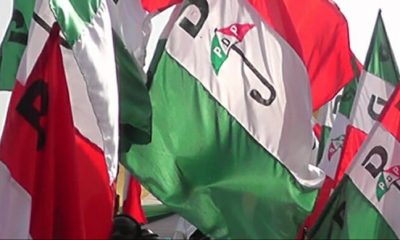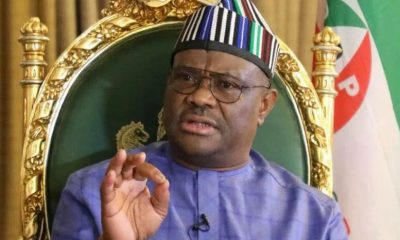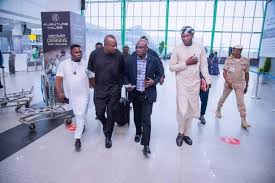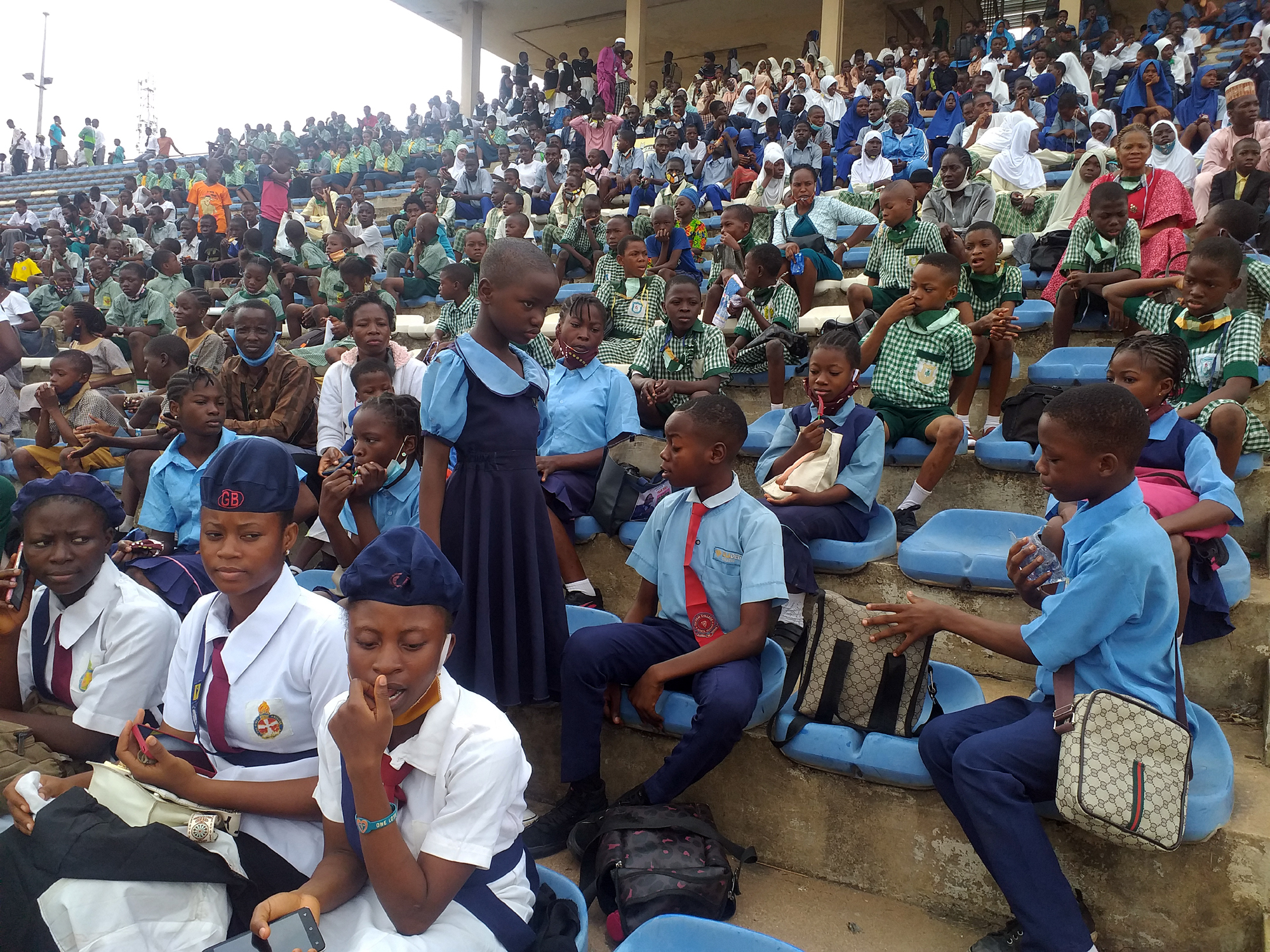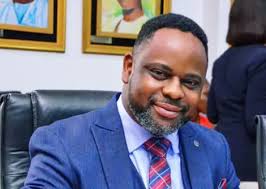OPINION
2022: A Peep into the Political Crystal Ball
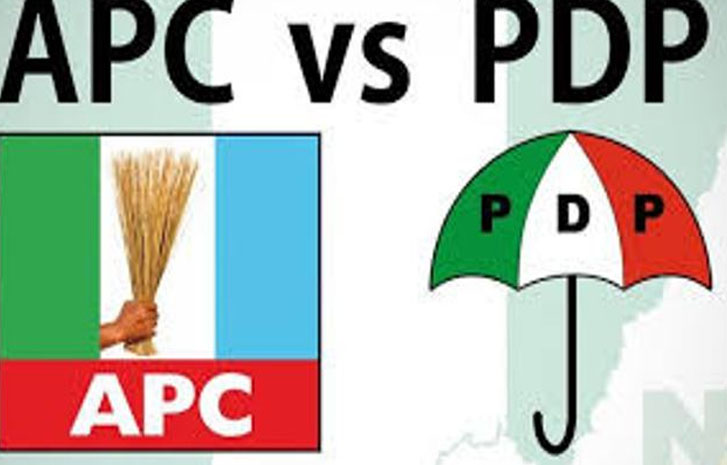
By Dakuku Peterside
The year 2021 is gone. Political intrigues and maneuvers were commonplace and sometimes deliberately stifling and exuberating during the course of the year. Political gladiators often played hide and seek games with critical political issues and gave undue attention to political inanities.
Some of the key highlights of 2021 were the interests displayed towards the amendment of the Electoral Act, the emergence of the Peoples Democratic Party (PDP)’s novel national executive council, and the success of the Anambra governorship election which produced Professor Chukwuma Soludo as the governor-elect, with high drama and national attention, to mention but a few.
These were only a dress rehearsal of what was coming.2022 is here, and all pointers are that this year will define the choices before Nigerians in 2023. This is the year that will determine the outcome of 2023. This column will explore the critical issues in 2022 that will shape the political and economic landscape and define the trajectory of Nigeria in the short to medium term. The issues include the outcome of the Electoral Act amendment, the National Convention of the All Progressives Congress (APC), the Ekiti/Osun governorship elections, the national convention/primaries of the two major political parties that will produce the flag bearers for 2023 elections, and the commencement of the presidential campaign.
The Electoral Act amendment bill, which is expected to provide the legal framework for the conduct of elections, is one of the intricate stitches to make the electoral system rig-proof, violence-free and protected against excessive monetisation. Unfortunately, it has become as controversial as the loopholes and deficiencies it seeks to address.
The fate of the bill and its outcome are a matter of conjecture, but there is no doubt that these will define the nature and confidence of the people in the 2023 general elections. President Buhari rejected the bill that espoused direct primaries and the electronic transmission of results. The ball is in the court of the National Assembly to overturn the President’s veto and promulgate the law. This looks unlikely as this Assembly seems not to have the temerity to push the law through.
It is evident that the clause requiring parties to mandatorily chose their candidates through direct primaries will be expunged. This is what President Buhari has said he wants to see before he signs the bill into law. From what has transpired, the provision for electronic transmission of results will be one of the new features of the Electoral Act whenever the President assents to the bill. This will be a confidence booster and a source of optimism in the Nigerian electoral process.
The long-anticipated elective convention of the ruling party is significant, not just for the party’s future but for democracy in Nigeria. The convention has been shifted endlessly, giving room for speculations. There is the fear that the convention will spotlight the deep internal divisions, entrenched powerplay, and contradictions in the party and set a significant crack. Another school of thought believes in the words of President George Washington that a “tiny clique of cunning, ambitious, and unprincipled men may have sized the party and subverted the will of the people”.
Whatever it is, there is an enormous responsibility on the shoulders of Mr President as the leader of the party. Not holding a convention to elect officers has both intended and unintended consequences that will not serve the party’s interest. APC’s error of judgement will be PDP’s gain. The president admitted this much in his recent media interview. The Progressive Governors, elected on the party’s platform, stand on the threshold of history as they have one more chance to rescue the party from the fatal error of poor judgment.
Concerning the presidency, the incumbent will not be running in the primaries or general elections, which will heighten the intrigues and horse-trading. Ethnicity, geopolitics, money, religion will all be in the cocktail that will determine the outcome of the primaries. Restraint may be thrown to the winds in the ruling party as the gladiators do not want to lose out. The opposition PDP will be the bastion of high wire horse-trading, with the governors playing an influential role, in the absence of a centre of ‘gravity’.
The governorship primaries of the two major political parties in the various states will be the natural battleground for presidential candidates, godfathers and power brokers. There is little reason to believe the primaries will be transparent, and that will be the foundation of internal rancour and crisis in the two major political parties. Fringe parties stand to benefit from the poorly managed internal processes of the major political parties.
The elaborate shadow boxing within each and between the All Progressives Congress (APC) and the Peoples Democratic Party (PDP) will manifest. Each of the two political parties has enough ingredients for self-destruction or survival and triumph within it. In the PDP, the issue of who emerges as the party’s presidential candidate will be highly contentious and may lead to the the implosion of the party. A PDP governor recently posited that, “The process of the emergence of our party’s (PDP) presidential flag bearer is going to cause a problem. But we will overcome it eventually and move ahead to defeat the APC whose process will lead to the breakdown of the party.”
In the case of the PDP, it is a party riddled with irreconcilable contradictions within it. There may be a significant revolt of the South-East and South-South strongholds, if party gives its ticket to someone from the North. On the other hand, how APC manages the emergence of and geopolitics of its presidential candidate may be its albatross. However, if, as expected, the party decides to turn to the southern part of the country for its presidential flag-bearer, then for all practical purposes, who from the South gets it will become an issue. The competition will be among gladiators who have one justification or another to claim the ticket. All three geopolitical zones in the South have what seems to them to be justifiable reasons to be allowed to fly the party flag. These well-entrenched and competing views will pose a conundrum for APC to deal with before a presidential candidate emerges.
The 2023 election campaigns that will commence in 2022 will allow politicians to address the issues that matter to the electorate. Although campaigns are not usually about issues but personalities, yet voters will relate with issues of the economy and insecurity, the same problems that defined the 2015 and 2019 presidential campaigns. It will not be out of place to predict that the political class has learnt little or no lessons. The 2022/2023 campaigns will pit the two major political parties against each other over the issue of change and its definition, which depends on where one stands.
By the last quarter of this year, the campaign of the parties will be about three issues, none of which is mutually exclusive: The performance of Buhari presidency, the economy, and security. Money or “stomach infrastructure” will become the defining factor during the campaign, and each party will want to outdo and outspend the other to win over the electorate. There is need for politicians not to heat up the polity during their campaigns. Already, Nigerians are victims of unabating insecurity and any additional violence and insecurity resulting from the campaign may get people to the tipping point.
I expect that APC and PDP will continue to dominate the political space, and the influence of new parties will be minimal, at best. The third force of pro-democracy activists, some neophyte political gladiators and some EndSARS revolution strategists have emerged. But they have a mountain to climb because they are to compete with the two big parties with experience, money, and the determination to grab and or keep power at all costs. The strength of this third force may be its newness; paradoxically, it is its weakness as well. It appears too late in the day to put up an organisational structure that can wrestle power from these tested political war horses. Historically, the youth, who constitute the major voting demographics, have never voted for themselves nor those who may cater to their interests. Often, they abandon reason and become beholden to godfathers propelled by the power of ‘stomach infrastructure’, a lexicon peculiar to the Nigerian brand of politics.
This year will witness two crucial gubernatorial elections – in Osun and Ekiti. These will provide essential indicators of where the Independent National Electoral Commission (INEC) and the hope for free and fair elections are headed. The outcome will significantly define the prospects for elections in the country. Whether Nigerians will be optimistic or pessimistic about the 2023 elections will reasonably depend on how these two crucial elections play out. Although they are off-season elections, with peculiarities different from those of general elections, it is our contention that they will set the tone for the 2023 elections. It will test the preparedness of INEC to conduct elections and provide useful lessons for the general elections.
One disturbing recurrent feature of Nigerian succession politics will replay. It is the neglect of governance in a transition election year. But the consequences in 2022 will be more severe. The neglect of governance in a time of severe economic hardship can yield serious unintended consequences in the form of social unrests and serial protests.
Nigerian politics is a minefield of complex highhandedness and political dribbling. But in the next few months, things will become more apparent than they are now. Nigeria is in the throes of an economic quagmire, intractable insecurity from terrorism, separatism and banditry, and the ravaging impacts of COVID-19. These asymmetrical issues speak to our current socio-economic realities that put us at the precipice of dysfunctionality and a rude walk to perdition. How we handle these five critical issues raised in this column will make or mar our political experience.
We are already in a combustible political, social, and economic situation requiring the careful navigation of issues to avoid trampling on frayed political nerves and triggering explosives on our national fault lines. By the last quarter of this year, governments in Abuja and various state capitals will stop functioning and shift their focus to politics and sthe urvival of political actors and power wielders. Although I do not have a crystal ball, a cursory look into my symbolical crystals for 2022 shows that we will navigate through it safely, although it may be a tough year. All these notwithstanding, permit me to wish my readers a happy new year and the best of 2022.
Dakuku Peterside is a policy and leadership expert.
OPINION
Nigeria’s Security: Between Self-defence and Community Policing

By Mukhtar Ya’u Madobi
As Nigeria continues to battle worsening security challenges — ranging from banditry and kidnapping to terrorism, insurgency, and communal violence — citizens across the country are increasingly embracing grassroots security measures and calls for self-defence.
These challenges are not confined to the North. In the South, militancy, piracy, secessionist agitations, cultism, and cybercrimes further complicate the nation’s fragile security landscape. Speaking at the maiden annual lecture of the National Association of the Institute for Security Studies, themed “Mobilising Stakeholders to Curb Insecurity in Nigeria: A Practical Approach,” the Director-General of the State Security Service (SSS), Oluwatosin Ajayi, stressed the need for communities to take greater responsibility for their own security. He cited examples where local populations had historically repelled insurgents and urged communities to work closely with security agencies to counter threats such as terrorism, banditry, and kidnapping.Ajayi noted that it is unrealistic to expect security agencies to protect every citizen across Nigeria’s expansive territory. He argued that communities must serve as the first line of defence, and that empowering them would enhance grassroots resilience, while reducing over-reliance on federal forces.Echoing this position, former Chief of Defence Staff, General TY Danjuma (rtd), recently renewed his longstanding call for Nigerians to rise in self-defence against non-state actors. Reacting to fresh waves of violence in Plateau, Benue, and other states, Danjuma insisted that citizens can no longer afford to remain passive while bandits and terrorists wreak havoc.“The warning I gave years ago remains valid. Nigerians must rise and defend themselves. The government alone cannot protect us,” he said.This message of self-defence has increasingly resonated across vulnerable communities, reflecting the harsh reality of an overstretched security system that leaves millions exposed. The roots of the crisis lie in decades of state neglect, porous borders, weak intelligence systems, and economic exclusion.In the North-West, states such as Zamfara, Katsina, and Kaduna are under the siege of bandits, who raid villages, rustle livestock, extort ransoms, and impose levies. In the North-Central region, particularly Plateau and Benue states, farmer-herder conflicts have morphed into sustained ethno-religious violence. The South-East contends with secessionist violence linked to IPOB/ESN elements, who often target security infrastructure. Meanwhile, the South-West and South-South struggle with cultism, ritual killings, and piracy.One chilling episode was the abduction of more than 280 schoolchildren in Kuriga, Kaduna State, in March 2024. Although the children were eventually rescued, the incident laid bare the glaring weaknesses in Nigeria’s security infrastructure and left the community traumatised.Faced with these realities, several states have begun taking their destinies into their hands. In April, the Kano State Government passed the Security Neighbourhood Watch Law to create a legal framework for community-led security efforts. Katsina has trained local vigilantes through its Community Watch Corps, while in Zamfara, Governor Dauda Lawal launched the Community Protection Guards (CPG), a controversial but welcomed initiative in rural areas long neglected by formal forces.In the North-East, the Civilian Joint Task Force (CJTF) continues to support military efforts against Boko Haram, leveraging local knowledge and swift response capabilities. The Amotekun Corps in the South-West, headquartered in Ondo State, has addressed critical security gaps in the region, earning both criticism and praise. Similarly, the South-East’s Ebube Agu and joint regional outfits in the South-South emerged from the growing public distrust in the federal government’s ability to guarantee safety.However, the growing wave of self-defence and vigilante initiatives raises ethical, legal, and practical concerns. Nigeria’s Firearms Act prohibits civilians from bearing arms without a licence. Without a clear regulatory framework, arming civilians risks escalating violence, enabling political thuggery, and creating new security threats under the guise of protection.These dangers are not hypothetical. In Edo State’s Uromi community, vigilantes wrongfully accused 16 Northern hunters of being kidnappers and burnt them alive. In July 2022, Ebube Agu operatives reportedly killed 14 unarmed wedding guests in Otulu, Imo State. Other vigilante groups in the region have been implicated in extrajudicial killings and abuses. A Daily Trust investigation in April revealed that vigilante groups killed at least 68 people in three months, with many more subjected to torture, harassment, or unlawful detention.These developments have prompted the House of Representatives Committee on Army to call for the regulation, oversight, and training of vigilante groups. The Uromi killings, in particular, triggered national outrage and renewed demands for accountability.Responding to these concerns, Major General Chris Olukolade (rtd), chairman of the Centre for Crisis Communication, acknowledged General Danjuma’s fears but cautioned against unregulated civilian self-defence. He warned that unless communities are engaged within a structured and legal framework, insecurity may only worsen. According to him, civilians should not be armed unless integrated into formal security systems with clear guidelines.Against this backdrop, community policing has emerged as a more sustainable and coordinated alternative. Under the leadership of the Inspector General of Police, pilot schemes have been launched across several states. These involve recruiting and training locals for surveillance, intelligence gathering, and early intervention, followed by their integration into existing police structures.Lagos, Ekiti, and Kano States have all recorded notable progress. In Kano, the Hisbah Corps, initially tasked with moral enforcement, has been reoriented to contribute to broader urban security. In Lagos, the Neighbourhood Safety Corps plays a vital role in gathering intelligence and issuing early warnings.Nonetheless, community policing faces serious limitations. Funding shortfalls, inter-agency rivalries, and a lack of coordination continue to undermine its effectiveness. A major stumbling block is the constitutional contradiction where state governors are designated as chief security officers but lack control over federal police operations within their jurisdictions.Solving Nigeria’s security crisis requires a comprehensive strategy that addresses institutional, legal, and socio-economic issues. First, the constitution must be amended to empower state and community policing structures with defined jurisdictions and robust oversight. Second, vigilante and self-defence groups must be trained, regulated, and integrated into the formal security architecture to avoid becoming a threat themselves. Third, intelligence gathering should begin at the grassroots, where community members are often the first to notice early warning signs. Fourth, addressing the root causes of insecurity — such as unemployment, poverty, and youth disenfranchisement — through investments in education, job creation, and social empowerment is essential. Lastly, traditional and religious leaders must be given formal roles in mediation, peacebuilding, and community-based conflict resolution, given their influence and trust within local populations.Nigeria’s security challenges demand more than rhetoric and reactive responses. While the instinct to defend oneself is natural in the face of government failure, unregulated self-defence is a risky and unsustainable path. The lasting solution lies in creating a decentralised, community-driven security model rooted in legality, ethics, and shared responsibility.As communities across the country face mounting threats, the question is no longer whether to adopt localised security strategies — but how best to coordinate, empower, and regulate them before chaos becomes the norm.Mukhtar Ya’u Madobi is a research fellow at the Centre for Crisis Communication. He can be reached via ymukhtar944@gmail.com.
OPINION
This Trial of Oloyede
By Tunde Akanni
It’s been traumatic for my entire family since that video started making the rounds. I sneaked a slight view… It’s our trial. It’s my trial. Oloyede is genuine. He is most sincere. He is modestly so, as well. For us, however, Allah knows best.
I was with a trader in the afternoon of what I considered a dark Wednesday, the 14th of May. “Se bi won ni JAMB o get mo bayi…”. I had to cut in immediately. Which JAMB? “Madam, that’s one person I will vouch, and vouch for…zero tolerance for corruption. Absolutely responsible with a high level of consciousness for the good of others. If certain things went wrong at JAMB, I agree it’s his responsibility to carry all pleasant and other burdens but just know that the bad side of the operations may as well be sabotage. I have absolute trust in that man. Ask my own colleagues about me, but Oloyede is my own hero, somebody I have known for more than 40 years…”This is by no means a reductionist disposition to the tragedy induced by the so-called computer glitch. May the Almighty God in His infinite mercy console the parents of the candidate reported to have committed suicide. May God strengthen them to survive this gloomy phase of their lives and sustain them to reap bountiful compensation that will endure in their lives. It’s hard, so hard to pull tragedies of this magnitude. I personally feel for these parents.The said computer glitch, may we never fall victim to it. Those who work for big organisations requiring a large layout of ICT operations know what I’m talking about. Rather than being ‘solutional’, IT facilities can be unimaginably problematic sometimes, yet indispensable in this civilisational dispensation. This is not doubting deliberate sabotage, as may have happened in the case of JAMB. I’ve been part of Oloyede’s JAMB journey to attest to his commitment to offer his best for the otherwise sinking board.Far from being cosmetically exhibitionist, the Oloyede-led JAMB team, led by the Education minister, Tunji Alausa, went round the critical facilities of JAMB during the just concluded examination. Alausa saw, firsthand, like never before elsewhere in this country, how far JAMB had gone in its strive for transparency and the real-time monitoring of the conduct of examinations nationwide. Alausa, beyond being in awe, sought to make the JAMB effect spread immediately to other examination bodies.No be dem say, same day, the WAEC team came to JAMB and made it into the situation room, which was my own duty post. The NECO team followed suit afterwards, both duly led around by the sturdy lead IT consultant who’s been reliably there from Oloyede’s assumption of duty, Damilola Bamiro. Far richer, given that they charge more for their exams, the duo of WAEC and NECO were suddenly mandated to understudy the examination sector leader in Africa that JAMB has become over time.The staff of both WAEC and NECO suddenly had to undertake a professional excursion led through all the real time monitoring screens and other digital facilities. It was obvious they marvelled at what they saw, revealing a functional leader-subordinate synergy manifest with trendy output that the world can see and learn from.But that may even seem like the tip of the iceberg of the output of the hard work and commitment of the nation’s foremost icon of integrity in public service. A series of far more seemingly serious strides had been accomplished by Oloyede at JAMB. As a focused scholar, he keeps ensuring that every bit of the experience of the Board is treasured as worthy data to guide future actions and even subjects for further research.Not even the agencies dedicated to emergency matters in Nigeria could have been as prompt as the Oloyede management on this ugly glitch saga. Once the complainants began ventilating into the public space, JAMB rose to the challenge without any predictably traditional arrogant stance of government is always right. I was aware that a particularly strident public critic and a former students’ leader at Obafemi Awolowo University, Adeola Soetan commended the spokesperson for JAMB for the excellent handling of public complaints.Promptly, an independent team of investigators was set up to unravel the mystery leading to the rather depressing situation that now confronts us. The team, drawn from assorted but technically relevant constituencies, has found out that no fewer than 165 centres of over 800 examination centres nationwide were affected.Obviously well prepared for whatever the outcome may turn out to be, he braced up to the challenge to embrace the surrender value to tell it to the world as it is. This trial is for all of us who believe and trust Oloyede. I am in this group. So much so that his public cry infected me…It was a patriot’s cry for his beloved country. Like me, a former Law don at LASU, Dr Kilani wasn’t any less affected as demonstrated in a quick note to me: “I write to associate myself with the pain, sorrow and emotion of our own Professor Oloyede. I could not hold my tears seeing him cry. May Almighty Allah see him through. May we all not be put to shame…”But then came a soothing message from Gbade Osunsoko, my cousin: “…He will come out of this much stronger because Nigerians will trust him far better than a number of our leaders.. A man that makes mistakes happens under him and takes responsibility – it’s a big deal in Nigeria.”With Oloyede, young Nigerians with challenges regarding sight are no longer left to moan their fate endlessly, with adequate provision for their inclusion in the UTME. How many of our public facilities are this inclusion conscious as stipulated by SDGs? How come a legacy built through almost a decade at the very best cost ever possible will be made to crumble when the game changer leader remains ever modest? JAMB has steadily risen through thick and thin to accomplish its tasks to the admiration of stakeholders, nationally and internationally, under Oloyede. Both NNPC and the Nigeria Police, being beneficiaries, can attest to the current competence of JAMB. How many other numerous stakeholders nationwide never deemed to have any relevance to JAMB before Oloyede but have since become critical, if not indispensable players?But why does this sudden saddening encounter threaten our joy of service without blemish? Why this unforeseen truncation of a good story, so intentional, coming from Africa? Whodunnit? Surely the truth shall come out for the world to perceive and assess and get to appreciate the efforts and the quantum of commitment appropriated to the JAMB excellence project driven by Oloyede.One cannot but be deeply concerned. Before the very eyes of a few of us carefully selected to give support from our respective professional perspectives from the very beginning, Professor Oloyede’s concern for genuine growth and development was real. It is still real and increasingly so, as a matter of fact. Indeed, inimitable. It shall be well.Tunde Akanni is a professor of Journalism and Development Communications at the Lagos State University, LASU. Follow him on X:@AkintundeAkanniOPINION
Democracy, Institutions, and the Rule of Law

By Kator Ifyalem
Democracy, often hailed as the cornerstone of modern governance, is a system that empowers citizens to participate in the decision-making processes that shape their lives. However, the mere existence of elections is not enough to ensure a fair, just, and prosperous society.
Without robust institutions, the rule of law, and ingrained values, democracy can become a hollow shell, susceptible to corruption, manipulation, and eventual collapse. At its core, democracy is built on the principle that power resides with the people. This power is exercised through fair elections, where citizens choose representatives to govern on their behalf. The effectiveness of this system relies heavily on the strength of supporting institutions, adherence to the rule of law, and shared values that guide societal behaviour.Institutions serve as the backbone of a democratic society, translating the will of the people into action. These include governmental bodies such as the legislature, executive, and judiciary, as well as independent organizations like electoral commissions, anti-corruption agencies, and human rights commissions. These institutions provide checks and balances, ensuring that no single entity or individual can accumulate too much power. They create a framework for accountability, transparency, and effective governance.An independent judiciary is crucial for upholding the constitution and protecting individual rights. Without it, laws can be manipulated or ignored by those in power, leading to tyranny. Similarly, a free and independent media acts as a watchdog, informing citizens and holding those in power accountable. When media institutions are weakened or controlled by vested interests, the flow of information is compromised, and citizens are unable to make informed decisions.The rule of law is another critical component of a functioning democracy. It ensures that all citizens, regardless of their status or position, are subject to the same laws and legal processes. This principle is fundamental to creating a fair and just society where everyone’s rights are protected. A robust legal framework, consistently and fairly enforced, provides the predictability and security necessary for social and economic development. It protects property rights, enforces contracts, and creates an environment conducive to investment and growth.Moreover, the rule of law is essential for protecting minority rights and preventing the tyranny of the majority. In a true democracy, the rights of all citizens must be respected, even if they are not part of the ruling majority. This protection is enshrined in laws and enforced through effective legal institutions.Values form the third pillar of an effective democracy. These shared beliefs and principles guide societal behaviour and inform policy-making. Democratic values include respect for human rights, tolerance of diversity, commitment to justice, and belief in the equality of all citizens. When these values are deeply ingrained, they act as a safeguard against authoritarian tendencies and help preserve the integrity of democratic institutions.For instance, a healthy democracy can be likened to a three-legged stool, where institutions, the rule of law, and democratic values form the legs. Just as a stool cannot stand stably without all three legs being strong and balanced, a democracy cannot function effectively if any of these elements is weak or missing. In Nigeria’s case, we’ve seen how weaknesses in one area, such as institutional challenges in election management, can put stress on the other legs, requiring the judiciary (rule of law) and civil society (democratic values) to bear more weight to maintain stability.Education plays a crucial role in instilling these values. A well-informed citizenry, aware of their rights and responsibilities, is better equipped to participate meaningfully in the democratic process. Civic education programs that teach the principles of democracy, the importance of institutions, and the value of the rule of law are essential for creating engaged and responsible citizens.The interplay between institutions, the rule of law, and values creates a self-reinforcing cycle that strengthens democracy. However, this cycle can also work in reverse. Weak institutions often lead to a breakdown in the rule of law, eroding democratic values and further weakening the system. This negative spiral will ultimately lead to the collapse of governance, even if the outward trappings of democracy remain.To prevent this decline, concerted effort is required on multiple fronts. Institutional capacity must be built and maintained through adequate funding, training, and support. The rule of law must be consistently enforced, with mechanisms in place to address corruption and abuse of power. This requires not only strong legal frameworks but also a commitment to their implementation.International cooperation also plays a role in strengthening democracy. Countries learn from each other’s experiences, share best practices, and provide support for development. However, it’s crucial to recognize that democracy cannot be imposed from outside; it must be nurtured from within.True democracy requires more than just the act of voting; it demands a comprehensive system of governance that respects the rights of all citizens, upholds justice, and promotes the common good. Strengthening these fundamental pillars (institutions, the rule of law, and values), is crucial in building more resilient, effective, and truly representative democracies that serve the needs of all citizens and contribute to global stability and prosperity. Where does Nigeria as a nation stand on this scale?
